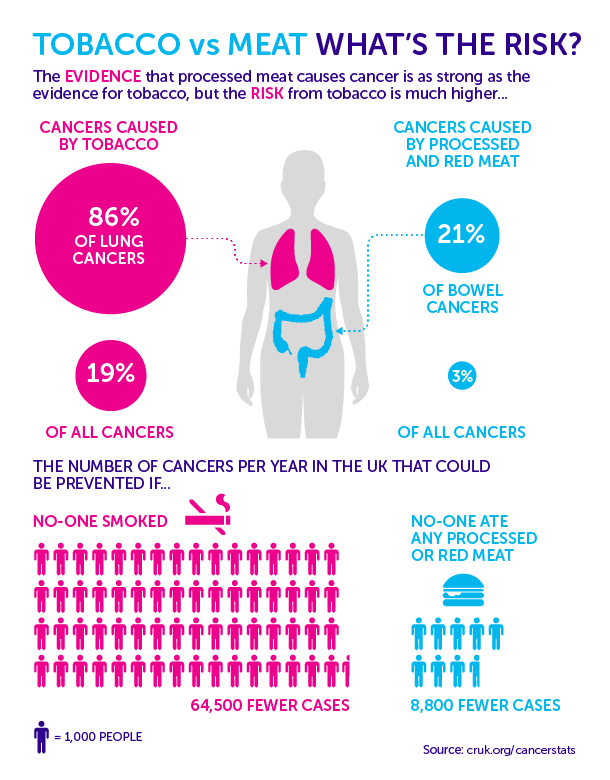Bacon cancer roundup
So now it’s official: processed meat is a IARC Group 1 carcinogen, red meat (including pork) is Group 2A. Their website is a bit slow at the moment, but they have a press release (PDF) and a Q&A (also PDF)
Over the past 24 hours there has been a lot of activity in science communication, trying to offset the early headlines that likened eating processed meat to smoking.
Obviously, the meat industries are also trying to play this down: the difference is we’re saying “look at the actual estimates” and they are saying things like “no published evidence that any single food, including processed meat, caused cancer.”
- Cancer Research UK has a good discussion of the risks and an infographic comparing the public health impact to smoking

- Ed Yong, at the Atlantic, writes
The International Agency of Research into Cancer (IARC), an arm of the World Health Organization, is notable for two things. First, they’re meant to carefully assess whether things cause cancer, from pesticides to sunlight, and to provide the definitive word on those possible risks.
Second, they are terrible at communicating their findings.
- Bloomberg has explanations and some nice graphics that move around.
- The story at Stuff and the new one at the Herald are pretty good, though they both kind of miss the point that people already aren’t eating bacon for the health benefits.
- 3News is very sensible. One News less so, leading with “putting processed meats in the same danger category as smoking or asbestos, though that doesn’t mean, say, salami is as bad as cigarettes.”
- Radio NZ is fairly unhelpful in interpreting the IARC ratings, surprisingly so given the high quality of their usual science coverage.
- Yesterday they had “Meat producers say a report expected to be released today that will suggest bacon, ham and sausages are as big a threat as cigarettes and arsenic will not look at the full picture.“
- Today: “The International Agency for Research on Cancer (IARC), which is part of the WHO and based in Paris, put processed meat like hot dogs and ham in its group 1 list, which already includes tobacco, asbestos and diesel fumes, for which there is “sufficient evidence” of cancer links.”
- Overseas:
- The Sydney Morning Herald is good
- New York Times is excellent; thorough and careful
- The Guardian is still running the headline “Processed meats rank alongside smoking as cancer causes – WHO” on the front of its site.
- The Daily Mail: “Bacon, burgers and sausages DO cause cancer, says World Health Organsiation as it classifies processed meat as as big a threat as cigarettes“
- Here’s what I said for the Science Media Centre
The International Agency for Research on Cancer (IARC) has declared processed meat a Group 1 carcinogen and red meat (their definition includes pork) as a Group 2A carcinogen. These are not based on new evidence and are not surprising findings; scientists have believed for a long time that some smoked, salted, or cured meats increase the risk of colorectal cancer and that higher meat consumption probably increases risk to some extent.
IARC’s press release confirms that the risk increase (about 1.2 times higher for one daily portion of processed meat) is small from an individual point of view, but that the large number of people who eat meat means that it has a noticeable public health impact. Cancer Research UK estimates that 21% of bowel cancers and 3% of all cancers could be prevented if no-one ate any red meat or processed meat
Some of the publicity for the new classification has tried to link the risk of cancer from processed meat to the risk of cancer from other Group 1 carcinogens. There is no justification for this. IARC classifications are based only on the strength of evidence for an effect at some (not necessarily realistic) dose; they do not consider the size of effect.
Group 1 carcinogens are those where IARC believes the cancer hazard is well-established, regardless of its strength. Group 1 includes asbestos, tobacco, and plutonium, but it also includes sunlight, oral contraceptives, and alcohol.
The only mention of other Group 1 carcinogens in the new IARC announcement is an explicit disclaimer in their Q&A, saying the classification does NOT mean that they are all equally dangerous. Bringing up other Group 1 carcinogens when explaining the cancer risks of meat consumption does not seem helpful for public understanding.
Thomas Lumley (@tslumley) is Professor of Biostatistics at the University of Auckland. His research interests include semiparametric models, survey sampling, statistical computing, foundations of statistics, and whatever methodological problems his medical collaborators come up with. He also blogs at Biased and Inefficient See all posts by Thomas Lumley »